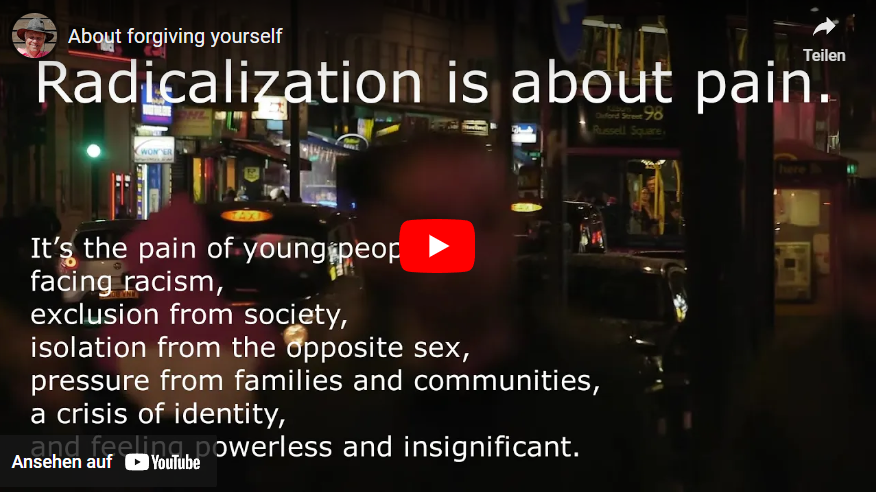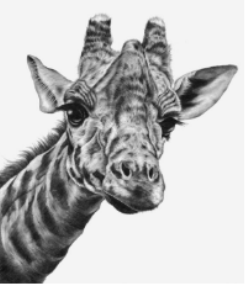I find the following vulnerable sharing from a former true believer in Jihad very touching and connecting. You see a 4-minute excerpt from a longer film by Deeyah Khan – Jihad: A Story of the Others.

Giraffe Mourning (Mourning without Self-Blame)
The healing and reconciliation process described by Marshall Rosenberg offers a structured view and a practical path on how destroyed relationships can be healed and rebuilt. The steps of this process are: 1) Empathy for the victim 2) Mourning of the perpetrator 3) Empathy for the perpetrator 4) How to make a better future together. The last step is the easiest and takes the least time, provided the other three have been completed. (Healing and Reconciliation Process: 7 minute explanation / longer demo)
In my understanding Abu Muntasir is facing the pain in his heart, when he looks squarely at how he impacted others with his harmful actions in the past. This giraffe mourning (or mourning without self-blame) is what Marshall asks the perpetrator to accomplish in the second step of the healing and reconciliation process. This second step is a formidable obstacle to restore relationships, therefore it is all the more remarkable that Abu Muntasir is able to mourn in such a way.
This goes to show the courage of Abu Mutasir, but also and not less the courage and skill of the film maker and interviewer Deeyah Khan, in establishing a trusting and safe relationship space for him to be able to open up in such a way. To be able to film such a precious moment, plus to actually have his willingness for his vulnerability to be shared in public – such conditions are very rare and a big gift to the world.
Fear of Overwhelming Pain
Contribution, making life more wonderful – maybe this is the strongest human need we share. Therefore it gives us both the most intense feelings of joy and the most intense feelings of pain. Such pain is very very scary. It is so much easier to deny responsibility by using one of the many tried-and-tested jackal methods.
In this vulnerable moment of mourning without self-blame lies a key for each of us and humanity as a whole to heal. If we want to learn to co-exist in a more peaceful and loving way in the future: we need to understand the extreme power of being able to face the pain of seeing how we contributed to making life less wonderful and embrace it, just the way Abu Muntasir does, when he holds with care the question of the interviewer and lets it sink in – deeply sink in – not pushing anything away, letting the pain pass through him as he looks at past actions in which he inflicted much pain on others and let it impact him in an acute pain ripping through his heart – until the storm calms and then to say:
“What can one answer to such a question?”
Which I hear as: “I would like to answer this question truthly, can you help me to do it in a way that fits for me?”
What is needed for forgiving oneself is the third step of the process of healing and reconciliation – a deeply felt understanding for the person that Abu Muntasir was, when he acted as an extremist in the past, the wonderful reasons that were alive in him at the time. That third step enables us to make different choices in the future, while condemnation and judgment will lead us to repeat the same unwanted behaviour again and again.
The Work of Deeyah Khan
Deeyah Khan is a filmmaker trying to deepen the understanding for extremist behavior. I am aware of two films she produced.
One on white supremacist extremists in the USA: ‘White Right: Meeting the Enemy‘
One on Jihad extremists in the United Kingdom: ‘Jihad: A Story of the Others.‘
I value both of them highly, as they provide intimate insights into the motivations that bring people to chose extremist violence.
They also show that understanding yourself is the key to finding a path that leads out of this tragic choice.

